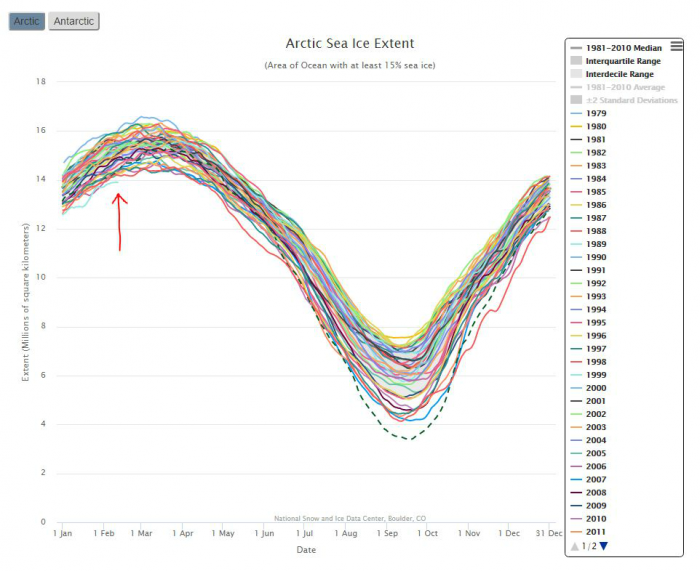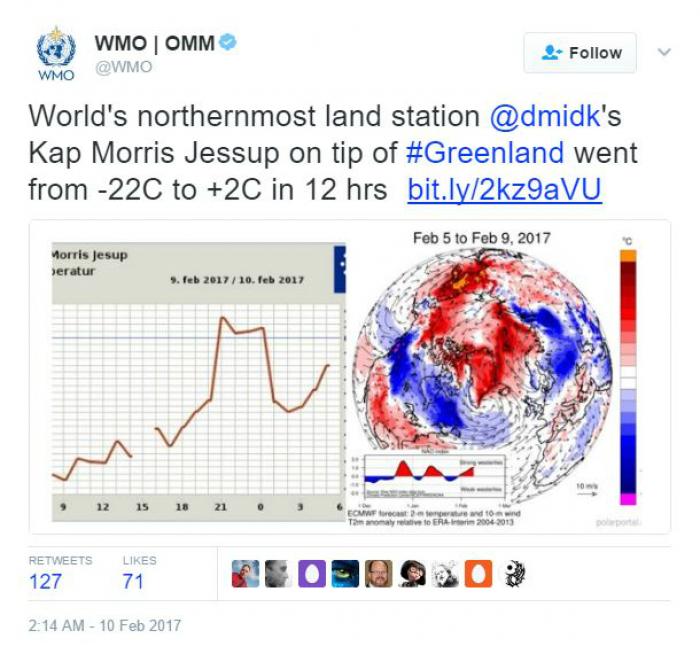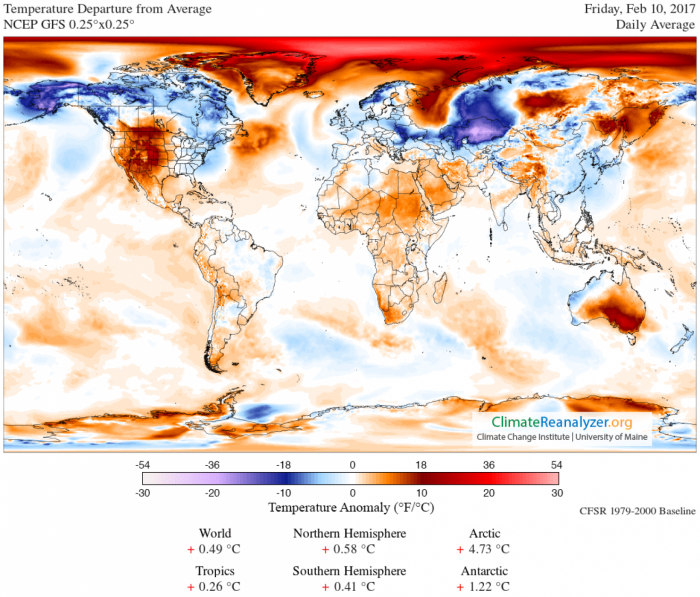We ask you, urgently: don't scroll past this
Dear readers, Catholic Online was de-platformed by Shopify for our pro-life beliefs. They shut down our Catholic Online, Catholic Online School, Prayer Candles, and Catholic Online Learning Resources essential faith tools serving over 1.4 million students and millions of families worldwide. Our founders, now in their 70's, just gave their entire life savings to protect this mission. But fewer than 2% of readers donate. If everyone gave just $5, the cost of a coffee, we could rebuild stronger and keep Catholic education free for all. Stand with us in faith. Thank you.Help Now >
No, a heatwave didn't just melt the North Pole
FREE Catholic Classes
Over the weekend, temperatures at the North Pole spiked to 20 degrees Fahrenheit above normal. That's quite a heatwave, even for temperate zones. But how newsworthy is this event and is it a cause for concern?

Shown: a heatwave in the Arctic.
Highlights
CALIFORNIA NETWORK (https://www.youtube.com/c/californianetwork)
2/13/2017 (8 years ago)
Published in Green
Keywords: North Pole, Arctic, ice, weather, El Nino, climate change, heatwave, temprature, global warming
LOS ANGELES, CA (California Network) -- A heatwave warmed the Arctic this weekend with temperatures spiking to 20 degrees Fahrenheit above normal in some places. One weather station on the northern end of Greenland, Cape Morris Jessup, reached 35F, a little above freezing. The North Pole however, remained colder. At this time of year, the average temperature is around 26 to 28 degrees Fahrenheit below zero.
At that temperature, even a heatwave of 20 degrees above average, the climate still remains in a deep freeze. There are few consequences to such a heatwave, since the temperature remains well below freezing. One storm does not make for a global catastrophe.
However, what has scientists concerned is the fact this is the third such storm of the year, and it has made its way all the way to the North Pole. Warm storms do enter the Arctic all the time, but it is very rare for them to reach the pole.
At the same time the storm was reaching the North Pole, Arctic ice extent is at a historic low, just shy of 13 million square kilometers. An average measurement would be closer to 15 million square kilometers, so the Arctic is below two standard deviations.

Arctic sea ice levels since 1979. The red arrow points to the record low 2017 level. The green dashed line is 2012. The 2017 measurement is well below average.
The 2016 year, which saw an El Nino in the Pacific, is one of the warmest years on record.
It is most likely that the El Nino, combined with decades of global warming, have caused the heatwave in the Arctic.
But perspective needs to be introduced. Earth has warmed by 2 degrees Fahrenheit since the 19th century. Last year was only a fraction of a degree warmer than 2015. And Arctic sea ice is at a record low, but only since 1979 when records were finally kept. And even a twenty-degree heatwave isn't enough to that the ice, at least not in February.

According to the World Meteorological Organization, the temperature at Cape Morris Jessup reached 35 degrees Fahrenheit. You'll still want a jacket.
Herein lies the problem. The planet is warming, but the process is by such small degrees that it can hardly be appreciated unless we examine long-term trends. When plotted over the long term, the pace of change is the most dramatic fact.
The climate is changing fast enough that is it contributing to an extinction rate that is 100 times the background rate of species extinction. Dozens go extinct each day. The problem with extinctions is if a keystone species that is essential to the food chain collapses, then the impacts could be devastating.
There are also problems with shifting climates causing problems for farmers and others who rely on the land and climate for their survival. The Inuit are intimately familiar with the havoc of climate change.
Is the Arctic heatwave a big deal? Not taken by itself. By itself it is merely a datapoint, and we need to concern ourselves with trends, not dramatic points. The trend is alarming, but this weekend's data point is not.

The red areas show deviation from normal, but perhaps it should be light blue? Despite the heatwave, the region remains well below freezing. You're going to need a jacket.
We need to maintain perspective and we need to shift the conversation. Presently, there is a major public debate over whether or not the planet is warming and if humans are responsible. But there are much greater questions to answer. What should we do about pollution? And how should we care for creation? How much should be set aside and how much should we manage for the benefit of humanity? Who should profit by such development and how much is reasonable?
As long as we quibble over what to do with our CO2 emissions, harmful or not, we distract ourselves from answering fundamental, ontological questions about our future. We must not be distracted or alarmed by stunning headlines like "Arctic 20 degrees hotter than normal!" when normal is still 26 degrees below zero, and 58 degrees below freezing.
It is time to change from the debates that divide us to the discussions that unite us, because no matter who is right or wrong about CO2 emissions, we still share the same planet. We breathe the same air, drink the same water, and will share a common fate. It's time to rise above the debate and look for ways to work together, not against.
--- The California Network is the Next Wave in delivery of information and entertainment on pop culture, social trends, lifestyle, entertainment, news, politics and economics.
We are hyper-focused on one audience, YOU, the connected generation.
JOIN US AS WE REDEFINE AND REVOLUTIONIZE THE EVER-CHANGING MEDIA LANDSCAPE.
Join the Movement
When you sign up below, you don't just join an email list - you're joining an entire movement for Free world class Catholic education.

Novena for Pope Francis | FREE PDF Download
-

- Stations of the Cross
- Easter / Lent
- 5 Lenten Prayers
- Ash Wednesday
- Living Lent
- 7 Morning Prayers
- Mysteries of the Rosary
- Litany of the Bl. Virgin Mary
- Popular Saints
- Popular Prayers
- Female Saints
- Saint Feast Days by Month
- Pray the Rosary
Pope Francis’ Final Message to Young People
Pope Francis’ Final Journey Through Rome: A Farewell Full of Symbols and Grace
Hagia Sophia: The 1,600-Year-Old Megastructure Where Heaven and Earth Still Meet
Daily Catholic
 Daily Readings for Tuesday, April 29, 2025
Daily Readings for Tuesday, April 29, 2025 St. Catherine of Siena: Saint of the Day for Tuesday, April 29, 2025
St. Catherine of Siena: Saint of the Day for Tuesday, April 29, 2025 Prayer for the Dead # 3: Prayer of the Day for Tuesday, April 29, 2025
Prayer for the Dead # 3: Prayer of the Day for Tuesday, April 29, 2025 Daily Readings for Monday, April 28, 2025
Daily Readings for Monday, April 28, 2025 St. Peter Chanel: Saint of the Day for Monday, April 28, 2025
St. Peter Chanel: Saint of the Day for Monday, April 28, 2025- Prayer before a Crucifix: Prayer of the Day for Monday, April 28, 2025
![]()
Copyright 2025 Catholic Online. All materials contained on this site, whether written, audible or visual are the exclusive property of Catholic Online and are protected under U.S. and International copyright laws, © Copyright 2025 Catholic Online. Any unauthorized use, without prior written consent of Catholic Online is strictly forbidden and prohibited.
Catholic Online is a Project of Your Catholic Voice Foundation, a Not-for-Profit Corporation. Your Catholic Voice Foundation has been granted a recognition of tax exemption under Section 501(c)(3) of the Internal Revenue Code. Federal Tax Identification Number: 81-0596847. Your gift is tax-deductible as allowed by law.


 Daily Readings for Tuesday, April 29, 2025
Daily Readings for Tuesday, April 29, 2025 St. Catherine of Siena: Saint of the Day for Tuesday, April 29, 2025
St. Catherine of Siena: Saint of the Day for Tuesday, April 29, 2025 Prayer for the Dead # 3: Prayer of the Day for Tuesday, April 29, 2025
Prayer for the Dead # 3: Prayer of the Day for Tuesday, April 29, 2025 St. Peter Chanel: Saint of the Day for Monday, April 28, 2025
St. Peter Chanel: Saint of the Day for Monday, April 28, 2025

